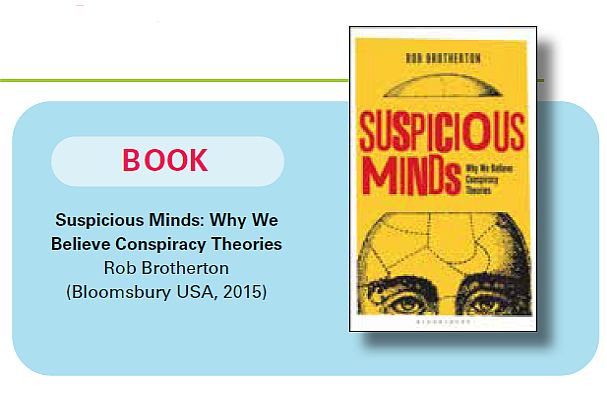A book review of
Suspicious Minds:
Why We
Believe Conspiracy Theories
by Rob Brotherton
(Bloomsbury USA, 2015)
This article first appeared in the Christian Research Journal, volume 39, number 3 (2016). For further information or to subscribe to the Christian Research Journal please click here.
Was 9/11 an inside job? Were the JFK and RFK assassinations isolated events or orchestrated by the CIA? Are vaccines deadly? Were weapons of mass destruction just a cover-up for the Iraq War? Does Area 51 contain the remains of UFOs? Did the church suppress accounts that Jesus married Mary Magdalene and had children? And on and on it goes.
Some conspiracy theories have turned out to be true: Iran/Contra, the missing weapons in Iraq, and the Watergate scandal, to name a few; but some are just outlandish accounts (e.g., Jesus’ marriage; lizard people disguised in high office; the American moon landings were a hoax). All this is the subject of Suspicious Minds: Why We Believe Conspiracy Theories (Bloomsbury USA, 2015) by Rob Brotherton, adjunct assistant professor at Barnard College, Columbia University.
So How Does One Distinguish a False Conspiracy from a True One? Brotherton argues that it is not about the facts. Choosing to believe a conspiracy in the government is more about our presuppositions. It is not the paranoid who believe these things. “We are all natural-born conspiracy theorists” (p. 17), Brotherton declares. “It turns out that we’re not always the best judge of why we believe what we believe” (12).
It is natural for all of us to arrange random data that we are presented with into meaningful patterns, and our propensity to ascribe negative intentions behind events in the world is not isolated. Although we like to think our judgments are based on evidence, Brotherton argues that a host of psychological factors come into play. He spends much of his book examining these factors, such as confirmation bias (shaping evidence to fit what we already believe), going over them in different ways until it gets repetitive.
The book has some great historical points about the origin of the Illuminati, the Protocols of Zion, JFK, and vaccinations. And, as noted, some theories were brought out to light, showing the conspiracy to be true. The FBI was started by President Taft based on the conspiracy story of white women being kidnapped and sold into prostitution. Trafficking today reveals this to be, in fact, true.
What If There Is No Evidence for the Conspiracy? Brotherton writes, “Thanks to this self-insulating logic, attempting to refute a conspiracy theory is like nailing jelly to a wall….Conspiracy theories aren’t just immune to refutation—they thrive on it” (77). Brotherton argues that our brains concoct stories to make sense of strange events—we can make the puzzle fit even when it does not. For example, proportionality bias is when we think that the larger the event (e.g., 9/11), the greater the hoax or wealth it took to create it. If we are not grounded, then we are susceptible to believe anything or do anything. Yet, says Brotherton in a well-crafted line that sums up his book, “By painting conspiracism as some bizarre psychological tick that blights the minds of a handful of paranoid kooks, we smugly absolve ourselves of the faulty thinking we see so readily in others” (243).
If You Believe in God, You Are a Conspiracy Theorist of a Sort. I argue that religions embrace a divine conspiracy, to use the words of the late Christian philosopher Dallas Willard, which posits a hidden hand behind world affairs directing the powers that be toward an agenda. The Christian conspiracy is that this divine being became one of us. His agenda is revealed in the Bible. He still works in and through His people to bring about a world that will be amazingly wonderful to those who embrace it and unequivocally terrifying to those who reject it.
How does one discern which ultimate and important beliefs are true? That is a question that requires more than mere reason and evidence to answer. It requires more than investigation or research, which are necessary. It requires one to do something more radical than look for clues or missing links in the data. It requires a desire to see beyond one’s self, and it is something only the brave can do: pray.
I recommend this book to understand why people believe the things they do, as such understanding can be very helpful in apologetics discussions. But watch out, they are following you! —Khaldoun Aziz Sweis
Khaldoun Aziz Sweis is an associate professor of philosophy at Olive-Harvey College. He has two books: Christian Apologetics (Zondervan, 2012), coedited with Chad V. Meister, and Debating Christian Theism (Oxford, 2013), coedited with Meister and J. P. Moreland. He blogs at www.logicallyfaithful.com.









